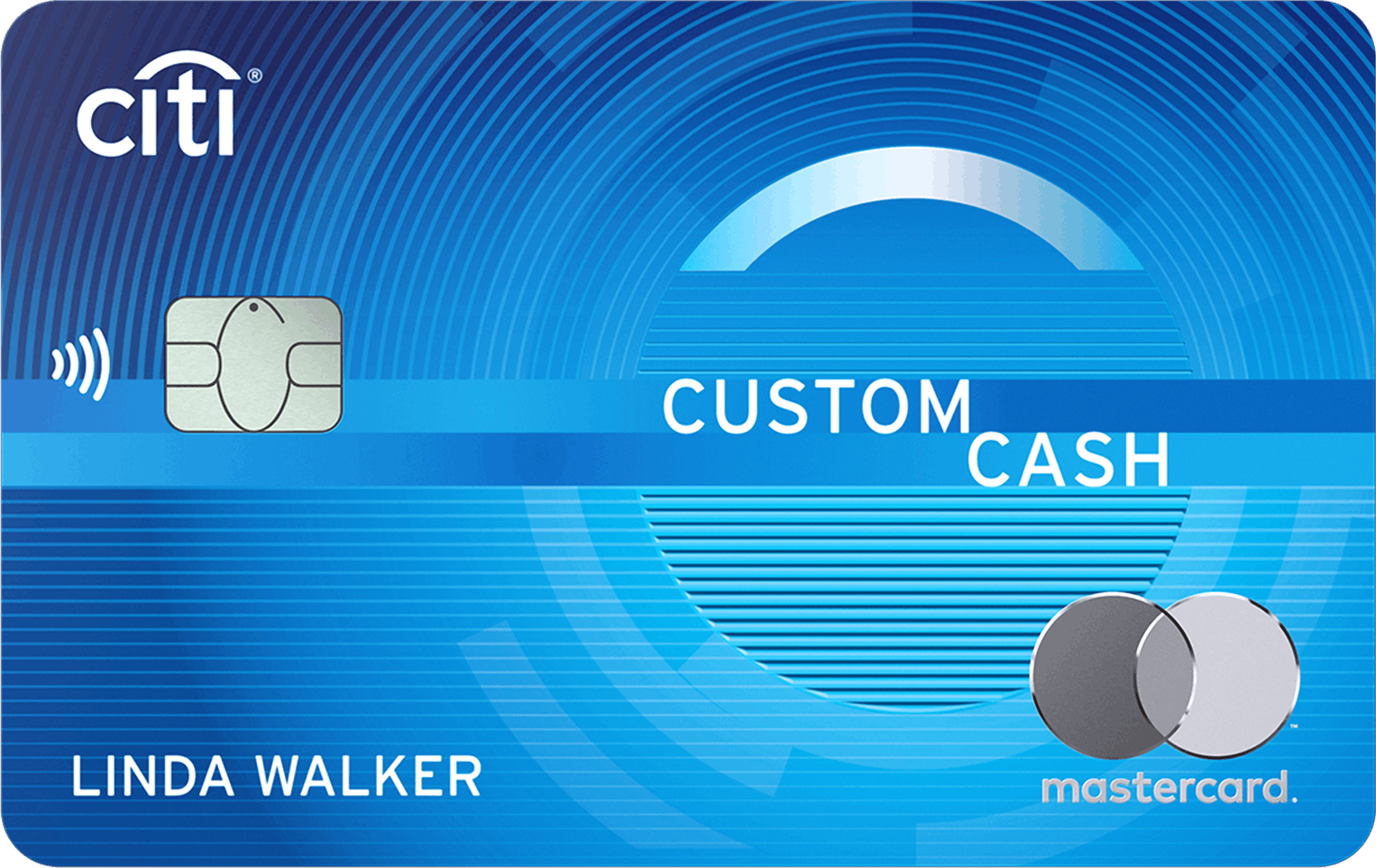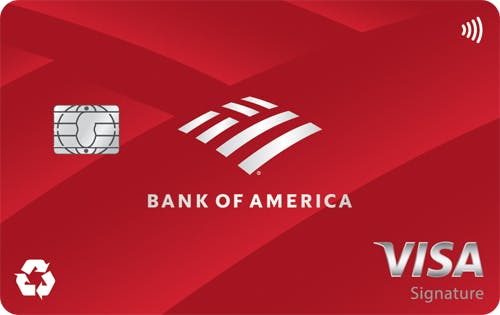This offer is no longer available on our site: Citi Custom Cash® Card
If you spend much of your day on the road, you could save money at the pump with a gas credit card.
Here’s our list of the best gas credit cards for 2025.
| Card | Best for |
|---|---|
| Citi Custom Cash® Card | Best for big gas expenses |
| Wells Fargo Autograph® Card | Best for rewards variety |
| Blue Cash Preferred® Card from American Express | Best for gas and groceries |
| Bank of America® Customized Cash Rewards credit card | Best for no annual fee |
| ExxonMobilTM Smart Card | Best for gas discounts |
| Hilton Honors American Express Surpass® Card | Best for road trips |
| Costco Anywhere Visa® Card by Citi | Best for Costco members |
| Sam’s Club® Mastercard® | Best for Sam’s Club members |
Best for big gas expenses: Citi Custom Cash® Card
Here’s why: This card offers serious rewards if gas is your biggest expense every month.
The Citi Custom Cash® Card automatically gives cardholders 5% cash back on up to $500 spent (then 1%) in their highest eligible spending category each month. Those categories include gas stations, so you could earn up to $25 in cash back any month you spend $500 on gas.
Just keep in mind that you earn only 1% on all other purchases, so you won’t get much cash back on gas if you spend more in another eligible category.
Plus, you’ll earn $200 in cash back after spending $1,500 on purchases in the first 6 months after your account opens.
The card also comes with a $0 annual fee.
For more details, read reviews of the Citi Custom Cash® Card.
Best for rewards variety: Wells Fargo Autograph® Card
Here’s why: The Wells Fargo Autograph® Card offers three points for every $1 you spend in several useful bonus categories, including at gas stations and electric vehicle charging stations.
In addition to fuel, you’ll earn three points per $1 spent on restaurants, travel, transit, popular streaming services and phone plans. All other purchases earn one point per $1. Wells Fargo lets you redeem your points for travel, gifts cards and cash back in the form of a statement credit.
Plus, there’s a $0 annual fee to help maximize your rewards value.
For more details, read reviews of the Wells Fargo Autograph® Card.
Best for gas and groceries: Blue Cash Preferred® Card from American Express
Here’s why: The Blue Cash Preferred® Card from American Express could save you at the pump — and when you’re checking out at the grocery store.
You’ll earn 3% cash back on U.S. gas station purchases and on transit (including taxis/rideshares, parking, tolls, trains, buses and more). You also get a whopping 6% cash back on up to $6,000 that you spend each year at U.S. supermarkets and 6% cash back on select U.S. streaming subscriptions. Plus, you can earn 1% cash back on all other purchases.
You’ll earn a $250 statement credit if you spend $3,000 on eligible purchases during the first 6 months after opening the account.
The Blue Cash Preferred® Card from American Express has an annual fee: $0 intro annual fee for the first year, then $95.
Read more about the Blue Cash Preferred® Card from American Express in our review.
Best for no annual fee: Bank of America® Customized Cash Rewards credit card
Here’s why: The Bank of America® Customized Cash Rewards credit card charges a $0 annual fee that won’t cut into your rewards balance.
This card is interesting because you can choose what category you get 3% cash back on each month. Those categories include gas, online shopping, dining, travel, drugstores or home improvement/furnishing.
You’ll get 3% cash back on purchases in the category of your choice (probably gas, since you’re reading this roundup), 2% on grocery store and wholesale club purchases and 1% on all other purchases. One thing to note: The 2% and 3% cash back categories are capped at a total of $2,500 in purchases each quarter. After you spend $2,500, you’ll get 1% cash back on all purchases.
You’ll also earn a $200 online cash rewards bonus if you spend $1,000 on purchases during the first 90 days after opening the account.
Our review of the Bank of America® Customized Cash Rewards credit card does a deeper dive into your options with this card.
Best for gas discounts: ExxonMobil™ Smart Card
Here’s why: The ExxonMobil™ Smart Card offers 12 cents of savings on every gallon of Synergy Supreme+ premium gas and 10 cents per gallon on other Synergy fuel grades when you pump at Exxon and Mobil locations in the U.S. Just remember that the percentage value of that discount depends on the price of gas in your area.
Plus, new cardholders can earn an extra 30 cents off each gallon for the first two months after their account opens.
And there’s no annual fee.
Learn more in our review of the ExxonMobil™ Smart Card.
Best for road trips: Hilton Honors American Express Surpass® Card
Here’s why: The Hilton Honors American Express Surpass® Card is the perfect credit card for road trips.
When you fill up, you’ll earn six points for every $1 you spend at U.S. gas stations. When you get tired and need to pull off the road, find a Hilton hotel — you’ll earn 12 points per $1 spent on purchases there. Purchases outside of bonus categories earn three points per $1 spent. You can use the points you earn to pay for future hotel stays.
The Hilton Honors American Express Surpass® Card comes with a $150 annual fee.
Check out our roundup of Hilton credit cards to learn more about the Hilton Honors American Express Surpass® Card.
Best for Costco members: Costco Anywhere Visa® Card by Citi
Here’s why: The Costco Anywhere Visa® Card by Citi offers 5% cash back on gas at Costco and 4% cash back on other eligible gas and electric vehicle charging purchases on up to the first $7,000 combined spend each year. After that, you’ll earn a standard 1% cash back on gas. That’s terrific value for people who already have a Costco membership.
You’ll also get 3% cash back on restaurant and eligible travel purchases, 2% back on all other purchases from Costco and costco.com, and 1% on all other purchases.
The Costco Anywhere Visa® Card by Citi doesn’t charge an annual fee, but the catch is you must be a Costco member to qualify. Membership costs a minimum of $65 per year.
Check out our review of the Costco Anywhere Visa® Card by Citi to learn more.
Best for Sam’s Club members: Sam’s Club® Mastercard®
Here’s why: When you pay with your Sam’s Club® Mastercard®, you’ll earn 5% cash back on up to the first $6,000 you spend each year (1% after the cap) at many gas stations across the U.S.
That’s an awfully nice discount, especially considering that it applies to both Sam’s Club and non-Sam’s Club gas stations. The only exception to the 5% cash back offer is when you fill up at a gas station outside of the U.S. and Puerto Rico, or one that’s owned by a competing wholesale club, supercenter or supermarket (like Costco).
There’s no annual fee, but you have to be a Sam’s Club member to get the card. A basic Sam’s Club membership costs $50 per year.
Our review of the Sam’s Club® Mastercard® breaks down who this card is good for.
How we picked these cards
We identified the best gas credit cards by singling out the highest available rewards rates offered every time you visit the pump. Once we settled on a core list of cards, we considered what kinds of people would benefit most from each card to settle on our unique categories.
In some cases, we chose not to pick cards that offer high gas rewards rates but with limited rewards redemption options. For instance, a card with a high gas rewards rate but no ability to redeem points for cash back does not have a clear audience in our eyes.
How do gas credit cards work?
There are two types of credit cards that could be considered gas credit cards. One type is issued by gas stations, and the other is a more general rewards card that offers bonus rewards for gas purchases.
Both types offer you rewards when you use the card at the pump, but it can matter which card you’re using and where.
The gas station-branded credit cards often offer a gallon-based discount. This is effectively a rebate that may be applied as a statement credit, depending on the card.
On the other hand, many of the traditional rewards credit cards that include gas as one of the bonus categories can earn cash back or rewards as a percentage of the whole price you pay for gas. These more-general credit cards may also offer cash back or rewards in categories other than gas as well.
Each card issuer has its own rules for gas rewards, so pay attention to the fine print.
Is a gas credit card worth it?
Whether a gas credit card is worth it depends on how much you spend on gas. Truckers or Uber and Lyft drivers might want to consider a gas credit card — but even if you just have a long commute, it could be worth it for you.
Think about your lifestyle and what makes the most sense for you — do you drive a ton and visit the same gas stations over and over? If you don’t spend a lot on gas, or if the gas credit card you’re considering doesn’t offer you rewards for the specific gas stations you typically visit, it’s worth considering where you do already spend money. Maybe you spend a lot at restaurants, in which case a dining rewards card would make more sense.
Do gas credit cards help you build credit?
Like most credit cards, a gas credit card can help you build credit as long as you meet a couple of criteria.
First, it’s important to pay your statement balance in full by the due date. Paying your bills on time can help you build or maintain a positive payment history, which is one of the many factors that determine your credit scores. And paying the full statement balance if it’s possible can also help keep your credit utilization rate low. Your utilization rate — or the percent of your available credit that you’re using at any given time — is another factor that can impact your credit.
Second, does the card issuer report your account activity to the three major consumer credit bureaus? If not, your positive payment history and low utilization rate won’t be able to help your credit. Which bureau the issuer reports to, or whether it reports at all, can vary — so we recommend checking with the issuer before you apply for a card.





